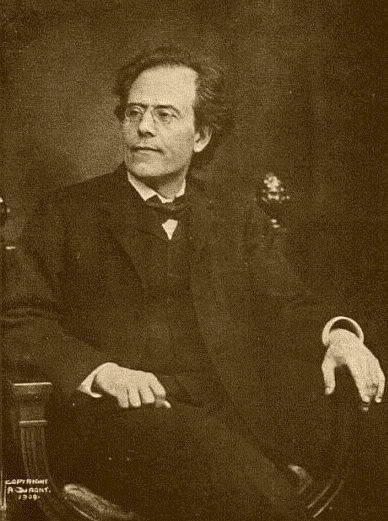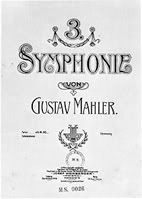Gustav Mahler's Symphony no. 3 is very likely the most philosophical piece of orchestral music ever composed — certainly nothing like it on such a scale (an hour and a half in length, calling for a gargantuan ensemble including a vocal soloist, chorus, and unusual instruments) has been attempted before or since.
That in itself is would have been no guarantee of immortality, and the symphony might have been a crackpot folly if it were not, like almost all Mahler's music, the product of genius. Even without knowing a scrap of what the composer had in mind, listening to a performance of the Mahler Third is an overwhelming experience. The themes, instrumental colors, rhythms, moods combine to captivate a listener's senses. But there is no doubt that Mahler was probing the meaning of life and the universe, influenced by Schopenhauer and Nietzsche, whose "Midnight Song" from Also Sprach Zarathustra he used in the symphony's fourth movement.
That in itself is would have been no guarantee of immortality, and the symphony might have been a crackpot folly if it were not, like almost all Mahler's music, the product of genius. Even without knowing a scrap of what the composer had in mind, listening to a performance of the Mahler Third is an overwhelming experience. The themes, instrumental colors, rhythms, moods combine to captivate a listener's senses. But there is no doubt that Mahler was probing the meaning of life and the universe, influenced by Schopenhauer and Nietzsche, whose "Midnight Song" from Also Sprach Zarathustra he used in the symphony's fourth movement.
Explaining and illustrating the philosophical content of the Mahler Third in a video sounds quixotic, boring, or impossible. But the documentary What the Universe Tells Me is none of those things; it accomplishes its purpose brilliantly, a work of controlled imagination that enthralls as it elucidates.
Mahler originally titled the six movements "Pan Awakes: Summer Comes Marching In," "What the Flowers in the Meadow Tell Me," "What the Animals in the Forest Tell Me," "What Humanity Tells Me," "What the Angels Tell Me," and "What Love Tells Me." Before the premiere performance he scrapped the titles, perhaps fearing that the audience would picture the themes too literally and miss the variety and subtlety of the music. The video narration takes its cues from the original titles, though, and tries to understand what Mahler implied.
The narration — by the actress Stockard Channing plus specialists, both musicological and philosophical — is closely bound into excerpts from a well played performance of the symphony by the Manhattan School of Music Orchestra, expertly conducted by Glen Cortese. The sound recording is clear and wide-ranging, the location a beautiful neo-Gothic church.
At the cost of being overly schematic, the course of the symphony can be described as a journey from the creation via a blind but imperative "Will" (as Schopenhauer put it), through the stages of a kind of spiritual evolution that includes both sweet and angst-filled intervals, to a final, paradoxical knowledge of ultimate joy won by passing through despair. A mezzo-soprano (here, Mignon Dunn, previously unknown to me but very much up to her part) singing the Nietzsche lyrics and a solo played on a posthorn (literally, a somewhat primitive instrument played by postmen in Mahler's youth) provide some of the work's misterioso effects. The long, slow final movement could well have been called "What Love Tells Me": it streams from another world of ineffable glory.
The performance selections aren't just little snippets, but long enough to convey the flavor of the part of the symphony under consideration. Visuals, mainly from nature, and commentary are very skillfully integrated with the music. The scholars who offer their thoughts (and who expand on them at greater length in the special features bundled with the documentary) provide interpretive insights without any of the agit-prop that would have been in the mix had this been produced by the BBC or PBS. Commenters include Henry-Louis de la Grange, author of the immense biography of Mahler, the star baritone Thomas Hampson, thoughtful musical scholars Morten Solvik and Peter Franklin, and an eloquent (and pretty) theologian, Catherine Keller.
Even if you think you know Mahler's Third Symphony well, I can almost promise you that What the Universe Tells Me will deepen your appreciation. It's available for rental as a single disc from Netflix, although I didn't realize until I read the reviews on Amazon.com that it's actually from a two-disc set that includes the complete performance on the second disc.
One of the incidental pleasures for me was seeing the young instrumentalists — mostly under 30, by their looks — playing their hearts out for Mahler. They will carry his vision to generations yet unborn, provided Western civilization survives its current troubles.
Midnight Song
(Friedrich Nietzche)
(Friedrich Nietzche)
Oh, man, give heed!
What does deep midnight say?
I slept!
From a deep dream I have waked.
The world is deep,
And deeper than the day had thought!
Deep is its pain!
Joy deeper still than its heartbreak!
Pain speaks: Vanish!
But all joy seeks eternity,
Seeks deep, deep eternity.
What does deep midnight say?
I slept!
From a deep dream I have waked.
The world is deep,
And deeper than the day had thought!
Deep is its pain!
Joy deeper still than its heartbreak!
Pain speaks: Vanish!
But all joy seeks eternity,
Seeks deep, deep eternity.





2 comments:
I think I had commented previously on your blog that Mahler's music seems prophetic to me; that is seems to tell the story of the 20th century.
Now that I know Mahler was influenced by the works of Nietzsche, I can understand the prophetic undertones.
Pastorius,
One of the fascinating qualities in Mahler's music is that his consciousness as expressed in sound straddles the world of 19th century late romanticism and that of 20th century existential anxiety. The way he juxtaposes the two sensibilities can sometimes seem strange and jarring, but both were absolutely real and compelling for him.
Post a Comment